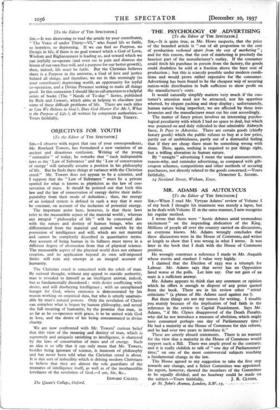THE PSYCHOLOGY OF ADVERTISING
[To the Editor of THE SPECTATOR.] SIR,—It is quite true, as Mr. Howe suspects, that the price of the branded article is "out of all proportion to the cost of production reckoned apart from the cost of marketing " ; and for this reason, that the cost of marketing is precisely the heaviest part of the manufacturer's outlay. If the consumer could fetch his purchase in person from the factory, the goods could doubtless be sold at a fraction above the bare cost of production ; but this is scarcely possible under modern condi- tions and would prove rather expensive for the consumer. Advertising has been found to be the cheapest wiy of securing nation-wide distribution in bulk sufficient to show profit on the manufacturer's costs.
It would naturally simplify matters very much if the cus- tomer's attention need not be attracted, nor his appetites whetted, by elegant packing and shop display ; unfortunately, human nature being imperfect, we are affected by these irre- levancies and the manufacturer must cut his coat accordingly.
The matter of fancy prices involves an interesting psycho- logical peculiarity with which I had no space to deal, but which was pounced on and duly ridiculed in that admirable Aldwych farce, It Pays to Advertise. There are certain goods (chiefly luxury goods) which the public refuses to buy at a low price, partly out of snobbishness, partly out of a distrustful feeling that if they are cheap there must be something wrong with them. Here, again, nothing is required to put things right, but a trifling alteration in human nature. -
By " straight " advertising I mean the usual announcement, reason-why, and reminder advertising, as compared with gift- coupon schemes, competitions and 'other methods of securing purchasers, not directly related to the goods concerned.—Yours
faithfully, DOROTHY L. SAYERS. 24 Newland Street, Witham, Essex.






















































 Previous page
Previous page